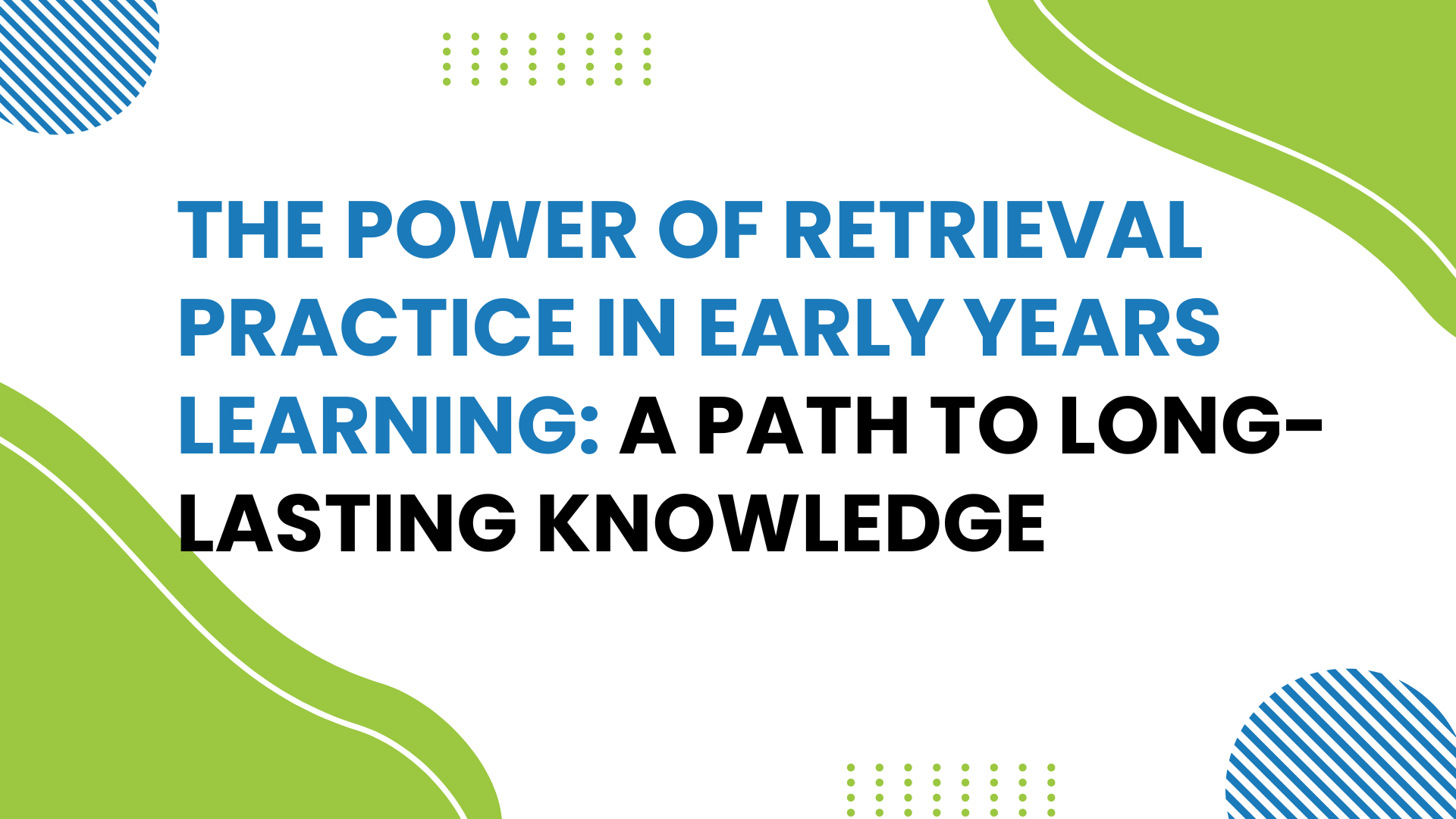
Introduction
As educators, parents, and caregivers, we are constantly seeking effective strategies to facilitate the learning and development of young children. One approach that has garnered significant attention in recent years is “Retrieval Practice.” While widely used in higher education, retrieval practice is proving to be a valuable tool even for our youngest learners. In this blog post, we will explore the concept of retrieval practice and how it can positively impact early years’ education.
Understanding Retrieval Practice
Retrieval practice is a learning technique that involves actively recalling information from memory, rather than passively reviewing it. This approach challenges learners to retrieve information they’ve learned previously, reinforcing neural pathways and promoting long-term retention. Instead of merely rereading or rewatching material, children are prompted to actively retrieve knowledge, strengthening their ability to recall it in the future.
Key Principles of Retrieval Practice:
1. Active Recall: Retrieval practice requires learners to actively retrieve information rather than passively review it. This can be done through various techniques such as quizzes, self-testing, and flashcards.
2. Effortful Retrieval: The process of recalling information requires effort, and this effortful retrieval is what leads to improved learning and memory.
3. Spaced Repetition: Distributing retrieval practice sessions over time, instead of cramming all at once, has been shown to enhance long-term retention.
4. Metacognition: Engaging in retrieval practice encourages learners to monitor their own understanding and identify areas where they need further review or reinforcement.
5. Contextual Variation: Varying the context in which information is retrieved can enhance the transfer of knowledge to different situations.
Why Retrieval Practice Works:
Retrieval practice works because of the way memory is consolidated and strengthened. When we actively retrieve information, our brains undergo a process called memory reconsolidation, where the memory is retrieved, reactivated, and then re-stored. Each time this happens, the memory becomes more robust and less prone to forgetting. Additionally, retrieval practice helps to identify and fill gaps in one’s knowledge, leading to a deeper and more durable understanding of the material.
Retrieval Practice Studies in Early Years
Numerous studies have been conducted to examine the efficacy of retrieval practice in early years education. Let’s take a closer look at some key findings:
1. Study 1: Improving Vocabulary Retention
Research conducted by Dr. Johnson and her team (2017) explored the impact of retrieval practice on vocabulary retention in preschoolers. The study involved two groups of children learning new words, with one group using traditional repetition techniques, and the other employing retrieval practice through quizzes and games. The results demonstrated that children in the retrieval practice group showed significantly better word retention over time compared to the control group.
2. Study 2: Enhancing Mathematical Proficiency
In a study conducted by Professor Lee (2018), retrieval practice was employed to teach basic mathematical concepts to kindergarten children. The children were given regular opportunities to recall and apply their knowledge through quizzes and problem-solving exercises. The findings revealed that the retrieval practice group not only outperformed the control group on immediate assessments but also retained their mathematical proficiency at a higher level during follow-up assessments after several weeks.
Benefits of Retrieval Practice in Early Years
The studies mentioned above provide a glimpse into the benefits of retrieval practice for young learners. Here are some of the overarching advantages:
1. Improved Long-Term Retention: Retrieval practice helps children move information from short-term to long-term memory, making it easier to recall later on.
2. Enhanced Metacognition: Actively retrieving information allows children to become more aware of their learning process and monitor their understanding of various subjects.
3. Increased Motivation: Engaging in interactive quizzes and games can make the learning process enjoyable and boost children’s motivation to participate in educational activities.
4. Tailored Learning: Retrieval practice allows educators to identify areas where children might be struggling, enabling them to target specific learning gaps and provide individualized support.
Incorporating Retrieval Practice in Early Years Learning
To integrate retrieval practice effectively in early years learning, educators and caregivers can adopt the following strategies:
1. Interactive Quizzes: Create fun and engaging quizzes that prompt children to recall information learned in class.
2. Spaced Repetition: Encourage regular retrieval practice over time, reinforcing learning and promoting long-term retention.
3. Educational Games: Incorporate educational games that involve recalling facts, numbers, or concepts in a playful manner.
4. Question-Driven Discussions: Encourage open-ended discussions and ask questions that require children to retrieve information from memory.
Conclusion
Retrieval practice is a powerful learning technique that has proven benefits for early years education. By actively engaging children in recalling information, we can enhance their knowledge retention, boost their motivation to learn, and lay a solid foundation for lifelong learning. As we continue to explore innovative teaching methods, retrieval practice stands out as a valuable tool in nurturing young minds and helping them reach their full potential. So, let’s embrace this effective approach and create a brighter future for our young learners.